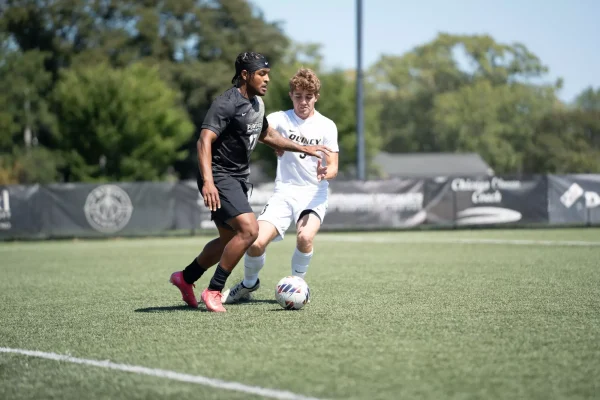PNW Passes NCAA Year-One Provisional Period
PNW advanced to the NCAA Divison II year-two provisional period on July 14 after completing the necessary year-one provisional requirements.
The year-one provisional requirements included the creation of an intercollegiate athletics committee and senior women’s administrator role, a campus visit from the NCAA and the production of multiple documents including an annual report and self-study guide that looked internally at PNW’s policies and procedures.
Rick Costello, athletic director, said the NCAA year-one provisional requirements were met due to university wide cooperation.
“This process has really strengthened us as an athletic program and a university,” Costello said. “We were very pleased with the outcome of year one.”
Costello said the year-two provisional period will focus on the continuation of the policies and procedures put in place during year one of the provisional process. In addition to continuing these requirements, PNW will transition from the Chicagoland Collegiate Athletic Conference, a NAIA conference, to competing in the Great Lakes Intercollegiate Athletic Conference, an NCAA Division II athletic conference, for the 2017-18 athletic season.
“We’ve got to ensure that all of our student-athletes continue to progress toward a degree,” Costello said. “That’s probably the biggest component of being in the NCAA moving forward, is that academically and eligibility wise we’re doing the right things.”
In comparison to the CCAC, which is comprised of 15 schools, nine of which are located in Illinois, the GLIAC is comprised of 12 schools with a majority being located in Michigan. PNW is the only university in the GLIAC located in Indiana.
Geoff Schultz, chair of the Faculty Senate and member of the IAC, said the expansion of athletics is attracting students who normally wouldn’t enroll at PNW from places farther away.
“They are very satisfied with the numbers that they are getting and also the quality of the academics these kids bring in,” Schultz said. “If we are moving into the type of campus we want to be, one that provides a real college experience, athletics is part of that for prospective students.”
Schultz said PNW’s move to the NCAA also puts a greater emphasis on athletes’ academics. There are more academic eligibility policies in place within the NCAA in comparison to the NAIA.
“They [student-athletes] are being held to a higher standard than last year,” Schultz said.
PNW formed the NCAA-required intercollegiate athletics committee on Jan. 20, which consisted of athletic department staff, faculty and administration. A second athletics committee was created during the summer of 2017 that answered to the student affairs committee within the Faculty Senate.
Schultz said the creation of the two athletic committees and the implementation of a faculty majority on the intercollegiate athletics committee demonstrated that faculty input is needed for athletic affairs.
“The fact that these structures are even built means that they [faculty] are acknowledging that this [athletics] is here to stay,” Schultz said.
Costello said he believes that PNW is on track to gain full NCAA Division II membership for the 2019-20 season.
“We really have a great structure in place for future success,” Costello said. “I don’t see any obstacles in the future.”
PNW will apply for the NCAA year-three provisional period on June 1, 2018. For PNW to be eligible for NCAA Division II postseason play, PNW must complete and advance through the three provisional periods. If completed, PNW will be eligible to compete in the NCAA Division II postseason as a full NCAA member during the 2019- 20 athletic season. PNW is currently able to compete in the GLIAC postseason for the 2017-18 athletic season.


